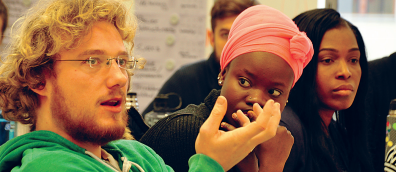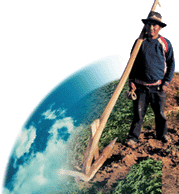

Global Change
Global environmental change processes modify the character of the earth system and therefore influence directly or indirectly the fundamental natural resources of mankind. Nowadays climate change is recognized as the most important factor driving these changes. Other facets of global environmental change concern the loss of biodiversity, vast deforestation, freshwater availability and soil degradation. Main drivers of these rapid changes are population growth, propagation and intensification of agriculture and industry, rising consumption of goods and energy and the globalization of the world economy. Scientific and public interest in global change issues is continuously growing. Actors and various levels (from local to international) are seeking political and institutional solutions for the pressing problems of Global Change. There is a growing demand for well-trained specialists who are able to cope with challenges of natural resource management under Global Change.
Aim of the Programme
The International Master programme GCM trains specialists who are able to effectively contribute to the mitigation of and adaptation to the drastic effects of Global Change. The main focus is on a proactive sustainable use of natural resources. The mission of the International Master Study Programme Global Change Management is to educate young professionals who are able to cope with challenges of natural resource management under global change in an adaptive, proactive and precautionary manner. This will be achieved by developing goal-oriented and science-informed solutions that are ultimately directed towards sustainability. Global Change Management is directed to graduates of different Bachelor or Diploma study programmes with interest in environment and development issues, transition processes and sustainability.
Partners
The programme is distinguished by the partnership with internationally renowned organisations which contribute with modules specifically designed for this study programme: Germanwatch e. V., Munich RE Foundation, Deutsche Gesellschaft für internationale Zusammenarbeit (GIZ), Naturschutzbund Deutschland (NABU) and the Potsdam Institute for Climate Impact Research (PIK). The partners contribute with modules specifically designed for this study programme.
Programme elements
1st Semester:
- Analysis of systems and the factors threatening them and human life
2nd Semester:
- Development of strategies for problem solving and implementation approaches
3rd Semester:
- Research project and internet based research colloquium (at a partner institution in Germany or abroad)
4th Semester:
- Research colloquium, Master thesis and defence (in total 120 ECTS credits)
All modules are taught in English language.
Contents and learning objectives
- Understanding dynamics of socio-ecological systems and their contribution to human well-being under global change
- Gaining knowledge about tools for assessing threats and risks for systems functionality
- Development of skills and insights needed for the identification of leverage points for change
- Application of gained knowledge for developing change management strategies and implementing them
Career opportunities
Mitigation of and adaptation to impacts of global change has become a cross-cutting issue in natural resource management. All corresponding sectors require experts capable of proposing proactive solutions to dynamically changing problems. Possible job opportunities in the context of:
• Local and national implementation of international conventions (e.g., land use and forestry projects as contribution to climate change mitigation)
• Adaptation of land and natural resource use to the projected climatic changes
• Adaptive management of protected areas
• Adaptive, global-change oriented management of development projects
• Economic and socio-political risk management (e.g., insurance companies)
The university degree "Master of Science" qualifies to enter a Ph.D. programme.
Have a look at some success stories of some HNE alumni here.










